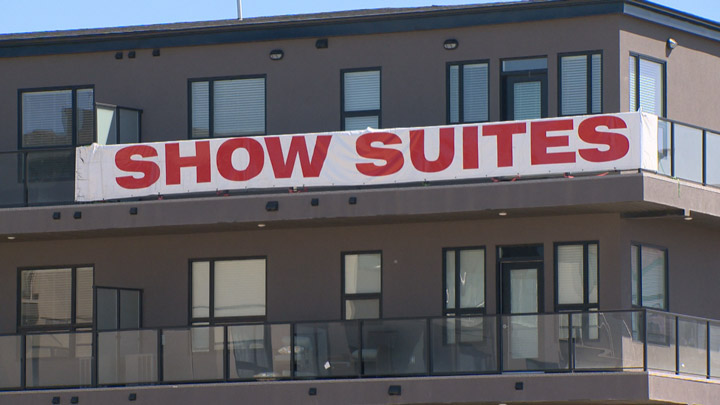It’s a common complaint Jamie Herle hears from condo owners — noise.

She recalls a situation where a woman would get dressed in the morning and then walk around while getting ready for work.
“She put her shoes on as part of the first process and walking back and forth across the floor drove the neighbours below crazy. And of course, their first thought was ‘she’s doing this is deliberately, this is deliberately to get us back,”’ Herle recalled.
“What happened? We had a knock on the door. We had a discussion with the property manager, found out the root of the issue. ‘Oh, my gosh, I’m so sorry. I didn’t even I didn’t think about it.’ And it was solved. The issue was solved.”
Herle, a Saskatoon lawyer and the president of the Canadian Condominium Institute (CCI), says not all condo disputes end amicably, however.
The complaints typically fall under three categories: people, pets and parking.
“You can always boil it down to one of those three,” Herle said.
“So we have this problem with condominiums and what you can and cannot do.”
While renters and landlords in Saskatchewan can turn to the Office of Residential Tenancies to settle disputes, there is no such recourse for condo owners and boards.
Their only mechanism to settle condo disputes is through mediation or the courts, which Herle said can be a long and costly process.
“By the time we get there, everybody’s seeing red,” Herle said.
“By the time we sit down to the pre-trial with the judge, which is supposed to be amicable and try to come to a solution, we’re already on very, very different pages.”
Instead, Herle would like the province to set up a tribunal such as the one in Ontario.
“We need an outlet to talk to each other, to get to the root of the issue and to move forward,” she said.
“It would go a long way to resolving disputes.”

In Ontario, disputes over issues such as pets, parking and access to records are handled by its Condominium Authority Tribunal.

Get daily National news
Heather Zordel said it is all about consumer protection.
“We needed some mechanism for people to be able to get things resolved in a cost-effective way. And that’s what we’re doing now,” said Zordel, chair of the Condominium Authority of Ontario.
Ontario follows three steps for dispute resolution. The first is self-guided negotiations between the parties. If a resolution isn’t reached, it then goes to a mediator. The final step is adjudication.
Zordel said the process is done completely online, making it very time-effective.
“So you have this benefit that people don’t have to show up for court. It’s all digital,” she said.

Herle said a similar process in Saskatchewan would be beneficial to owners and condo boards.
“A tribunal or a place for condo corporations and/or owners to go to settle disputes with trained mediators, I think, would help,” she said.
“We need an outlet to talk to each other, to get to the root of the issue and to move forward.”
A Global News request for an interview with Saskatchewan’s justice minister to discuss whether a tribunal is needed the province was declined.
In an emailed statement, Gordon Wyant said under the province’s Condominium Property Act, disputes can be handled privately by the parties.
“The condominium dispute resolutions processes, updated in 2014, offer a number of options to condominium corporations or owners including discussion, negotiation, mediation, arbitration and applications to Small Claims Court or the Court of Queen’s Bench,” Wyant said.
Zordel said Ontario’s tribunal has handled 402 cases since it was set up in 2017. Of those, 84 were resolved during negotiations and 121 in mediation.
She said the tribunal is setting precedence for other boards and owners.
“We post them on our website and people can go see what decision has been in different circumstances,” Zordel said. “They can look at it and see what determinations are being made. That actually leads to more dispute resolution without having to go through that process because you’ve got the precedence there.”
She added that decisions can be appealed to the courts, but only on a question of the proper interpretation of the law.
Herle said there are some disputes, such as non-payment of fees or foreclosure against a unit that would require the courts to be involved.

She said safety issues can be handled outside the court process.
“If there was hoarding or issues of safety, the fire department is your call,” Herle said.
That happened recently in Saskatoon. The fire department closed Prairie Heights condo building in May due, in part, to unsafe living conditions and water leaking into an elevator shaft.
The court has appointed an administrator to handle the building’s affairs, including levying condo fees against the owners. Earlier this year, the fire department said one person controls 15 suites in the 44-unit building, and the estate of another individual owns 11 suites — and no organization was actively working on their behalf.
Another solution Herle said condo boards can look at is a three-strike rule for bylaw enforcement.
“So a letter from the board telling them that they’ve breached a bylaw, a second letter, the third would come from (a lawyer),” she said.
“Then the next (step) is they either go to mediation or to court.”
However, Herle said taking it to a tribunal is the best avenue for all involved.
“This would provide another out and it would probably settle a lot of disputes as well,” she said. “It would provide a venue to settle disputes so they don’t escalate to a further level because that’s what we’re seeing — escalation.”






Comments
Want to discuss? Please read our Commenting Policy first.